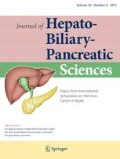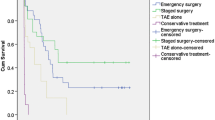Abstract
Objectives
To examine the survival of patients with spontaneous ruptured hepatocellular carcinoma treated with transarterial embolization (TAE).
Methods and materials
Patients diagnosed with spontaneous ruptured hepatocellular carcinoma treated with TAE were retrospectively studied. Hospital records were reviewed and data were collected and analyzed from the years 2000–2006. A total of 62 patients who had been diagnosed with spontaneous ruptured hepatocellular carcinoma were managed in our hospital during this period.
Results
All 62 patients (who had been diagnosed with ruptured hepatocellular carcinoma and were managed in our hospital) patients were treated with TAE, with a success rate of 91% (57/62). Early mortality (within 30 days after rupture) was 38%. Factors that were associated with early mortality were old age, low hemoglobin at presentation, elevated bilirubin at presentation, prolonged prothrombin time at presentation (INR > 1.3), low albumin level at presentation, and unsuccessful embolization. A low albumin level was the only independent risk factor for early mortality. The overall median survival time was 39 days. Surgical resections were possible in seven patients. Their cumulative survival was significantly longer (P = 0.002) than that of patients managed with non-operative treatment after embolization.
Conclusion
Transarterial embolization (TAE) can achieve good hemostasis, though low albumin level, which reflects poor liver reserve, may predict early mortality. Portal vein thrombosis should not be regarded as an absolute contraindication for TAE. Staged surgical resection after embolization is safe and produces a good survival outcome.
Similar content being viewed by others
References
Ong GB, Chu EPH, Yu FYK, Lee TC. Spontaneous rupture of hepatocellular carcinoma. Br J Surg. 1965;52:123–9.
Yamagata M, Maeda T, Ikeda Y, Shirabe K, Nishizaki T, Koyanagi N. Surgical results of spontaneously ruptured hepatocellular carcinoma. Hepatogastroenterology. 1995;42:461–4.
Chearanai O, Plengvanit U, Asavanich C, Damrongsak D, Sindhvananda K, Boonyapisit S. Spontaneous rupture of primary hepatoma: report of 63 cases with particular reference to the pathogenesis and rationale treatment by hepatic artery ligation. Cancer. 1983;51:1532–6.
Liu CL, Fan ST, Lo CM, Tso WK, Poon RTP, Lam CM, et al. Management of spontaneous rupture of hepatocellular carcinoma: single-center experience. J Clin Oncol. 2001;19:3725–32.
Sato Y, Fujiwara K, Furui S, Ogata I, Oka Y, Hayashi S, et al. Benefit of transcatheter arterial embolization for ruptured hepatocellular carcinoma complicating liver cirrhosis. Gastroenterology. 1985;89:157–9.
Ong GB, Taw JL. Spontaneous rupture of hepatocellular carcinoma. BMJ. 1972;4:146–9.
Hirai K, Kawazoe Y, Yamashita K, Kumagai M, Nagata K, Kawaguchi S, et al. Transcatheter arterial embolization for spontaneous rupture of hepatocellular carcinoma. Am J Gastroenterol. 1986;81(4):275–9.
Shiina S, Ibukuro K. Transcatheter arterial embolization for the treatment of ruptured hepatocellular carcinoma. AJR Am J Roentgenol. 1989;153:658–9.
Ohtomo K, Furui S, Kokubo T, Yamauchi T, Yashiro N, Itai Y, et al. Transcatheter arterial embolization for spontaneous rupture of hepatocellular carcinoma: emergency chemoembolization or embolization. Radiology. 1991;180:647–51.
Corr P, Chan M, Lau WY, Metreweli C. The role of hepatic arterial embolization in the management of ruptured hepatocellular carcinoma. Clin Radiol. 1993;48:163–5.
Ngan H, Tso WK, Lai CL, Fan ST. The role of hepatic arterial embolization in the treatment of spontaneous rupture of hepatocellular carcinoma. Clin Radiol. 1998;53:338–41.
Yeh C-N, Lee W-C, Jeng L-B, Chen M-F, Yu M-C. Spontaneous tumor rupture and prognosis in patients with hepatocellular carcinoma. Br J Surg. 2002;89:1125–9.
Chiappa A, Zbar A, Audisio RA, Paties C, Bertani E, Staudacher C. Emergency liver resection for ruptured hepatocellular carcinoma complicating cirrhosis. Hepatogastroenterology. 1999;46:1145–50.
Hai L, Yong-Hong P, Yong F, Ren-Feng L. One-stage liver resection for spontaneous rupture of hepatocellular carcinoma. World J Surg. 2005;29:1316–8.
Lai EC, Lau WY. Spontaneous rupture of hepatocellular carcinoma a systematic review. Arch Surg. 2006;141:191–8.
Sunderland GT, Chisholm EM, Lau WY, Chung SC, Li AKC. Alcohol injection: a treatment for ruptured hepatocellular carcinoma. Surg Oncol. 1992;1:61–3.
Fuchizaki U, Miyamori H, Kitagawa S, Kaneko S. Radiofrequency ablation for life-threatening ruptured hepatocellular carcinoma. J Hepatol. 2004;40:354–5.
Shiratori M, Nagashima I, Takada T, Morofuji S, Motomiya H, Matsuda K, et al. Successful treatment of ruptured hepatocellular carcinoma with intraperitoneal injection of OK-432. J Hepatobiliary Pancreat Surg. 2004;11:426–9.
Shimada R, Imamura H, Makuuchi M, Soeda J, Kobayashi A, Noike T, et al. Staged hepatectomy after emergency transcatheter arterial embolization for ruptured hepatocellular carcinoma. Surgery. 1998;124:526–35.
Liu CL, Fan ST, Lo CM, Tso WK, Poon RT, Lam CM, et al. Management of spontaneous rupture of hepatocellular carcinoma: single-center experience management. J Clin Oncol. 2001;19:3725–32.
Tan FL, Tan YM, Chung AY, Cheow PC, Chow PK, Ooi LL. Factors affecting early mortality in spontaneous rupture of hepatocellular carcinoma. ANZ J Surg. 2006;76:448–52.
Author information
Authors and Affiliations
Corresponding author
About this article
Cite this article
Li, WH., Cheuk, E.CY., Kowk, P.CH. et al. Survival after transarterial embolization for spontaneous ruptured hepatocellular carcinoma. J Hepatobiliary Pancreat Surg 16, 508–512 (2009). https://doi.org/10.1007/s00534-009-0094-6
Received:
Accepted:
Published:
Issue Date:
DOI: https://doi.org/10.1007/s00534-009-0094-6




